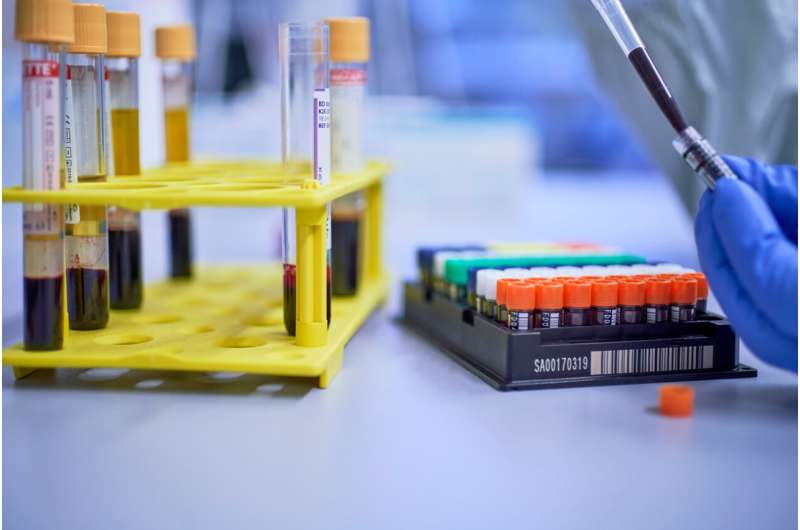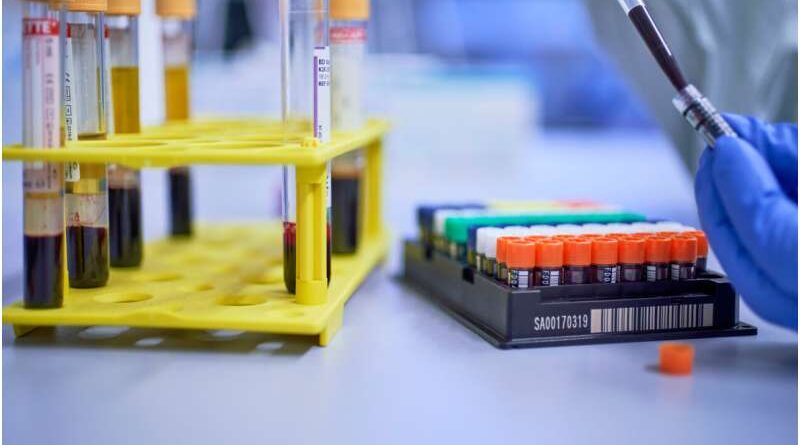Case report: Severe systemic lupus decompensated after cancer treatment

No symptoms of systemic lupus can currently be detected after treatment with anti-bispecific antibody, either in the laboratory or in the clinic. Credit: Charité | Arne Sattler
Universitätsmedizin Berlin was surprised by the significant improvement seen in a female patient with severe systemic lupus erythematosus (SLE) after treatment with the cancer drug teclistamab. Not too long ago, the 23-year-old was confined to a wheelchair due to an autoimmune disease.
About six months after starting treatment, the patient is now completely symptom-free. Only time will tell if this improvement will last for a long time, but the case that the team has announced New England Journal of Medicine-marks a promising starting point for further studies.
Nothing was reducing the 23-year-old Berlin patient’s symptoms enough, including cortisone and eight other treatments that would have weakened his overactive immune system.
His autoimmune disease, which was diagnosed as systemic lupus erythematosus, was very severe and was affecting four of his limbs. Her skin was blistered, her joints and kidneys were severely swollen, and her red blood cell count, which supplies oxygen to the body’s cells, was very low.
Dr. Tobias Alexander, the doctor treating him at the Department of Rheumatology and Clinical Immunology, says: “Due to the constant pain he was feeling, he was unable to walk anymore, walking in a wheelchair, ‘ and his kidneys were in danger of failing. at Charité. As the Head of the Rheumatology Clinic, “he had never seen such a difficult case before.”
Since all treatment options had been exhausted, he suggested that the patient take teclistamab—the first time it had been tried. Teclistamab is a bispecific antibody approved for the treatment of multiple myeloma, a cancer of the plasma cells in the bone marrow.
In systemic lupus erythematosus, plasma cells produce autoantibodies, which are antibodies that target the body’s own cells.
Alexander, a rheumatologist, explains, “Teclistamab is very effective in destroying plasma cells and it also works against their original cells, which would quickly produce new plasma cells. So we thought that the drug of cancer can eliminate the cause of systemic lupus and help the patient in the long run.
The disease is no longer visible after five injections
With the patient’s consent, the drug was prescribed “off-label.” The treatment was administered on an outpatient basis at the Department of Hematology, Oncology and Cancer Immunology at the Charité Benjamin Franklin Campus and proved successful: Five injections of cancer drugs given under the skin of the abdomen over a period of weeks five gradually relieved the patient’s symptoms.
After a few weeks, her kidney function and blood status improved and the inflammation in her skin and joints completely subsided. Since mid-October, no autoantibodies have been detected in the blood of the 23-year-old, although the treatment with immunosuppressants was stopped before the start of the treatment and cortisone was no longer given after six weeks .
“The patient is completely relaxed,” says Alexander.
“That means that he no longer has any symptoms of his disease and we will not find any more signs of systemic lupus, either clinically or in the laboratory. It would be too early to tell that he is cured, but such strong results are a complete exception in rheumatology and are even more remarkable considering that none of the existing treatment methods were sufficiently effective before.
“Above all, the success of the treatment, in fact, means an immeasurable improvement in the patient’s quality of life, which we enjoy. However, we do not know whether the positive results are how long will it take. Because the results are temporary, the treatment is not yet suitable for widespread use.”
Risks of treatment
The drug’s strong influence on the immune system also poses many risks. For example, immune cells can produce excessive amounts of inflammatory mediators. Depending on its progression, this type of cytokine release can be life-threatening. The patient who was treated by Charité also developed a severe cytokine release syndrome during teclistamab treatment, developed pneumonia and sinusitis, and the number of antibodies in his blood dropped.
Professor Jan Krönke, who was in charge of the patient’s oncological treatment, says: “These side effects are more serious than those found in conventional arthritis treatments and sometimes require outpatient treatment. “But they agree. and the response that teclistamab causes in patients with multiple myeloma, so they were unexpected.”
To determine how long the positive effects of teclistamab last, the treatment team is monitoring the patient’s immune system. If they prove long-term and are confirmed in other studies, Alexander believes the potential benefits of the cancer drug in rheumatology could be huge.
“For now at least, the therapeutic results of teclistamab for the patient are comparable to the therapeutic effect of CAR T cells. The difference is that the anti-bispecific antibody is much easier to use and can be administered in a short time, it would be great. good.”
CAR T-cell therapy is a new treatment that has been able to save autoimmune diseases for many years in individual cases. However, they require chemotherapy and gene therapy and are time-consuming and resource-intensive.
Additional information:
Tobias Alexander et al, Teclistamab-Induced Remission in Refractory Systemic Lupus Erythematosus, New England Journal of Medicine (2024). DOI: 10.1056/NEJMc2407150
Provided by Charité – Universitätsmedizin Berlin
ExcerptCase report: Systemic lupus no longer seen after chemotherapy (2024, September 5) Retrieved September 6, 2024 from https://medicalxpress.com/news/2024-09-case -severe-lupus-longer-cancer.html
This document is subject to copyright. Except for any legitimate activity for the purpose of private study or research, no part may be reproduced without written permission. Content is provided for informational purposes only.
#Case #report #Severe #systemic #lupus #decompensated #cancer #treatment
